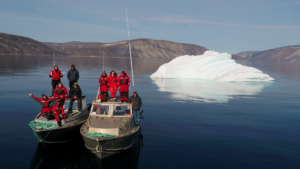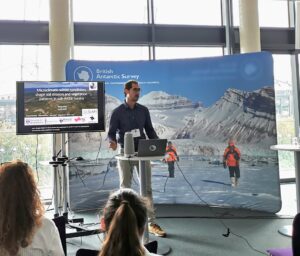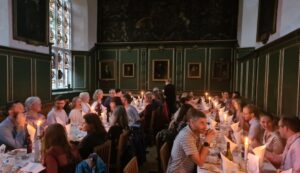St Andrews students present at the UK Arctic Science Conference
As members of both the University of the Arctic (UArctic) and the Scottish Arctic Network, the University of St Andrews is actively engaged in research and teaching focused in and about the North. From cultural heritage to rural healthcare, staff and students are working on wide range of research in order to explore common priorities and address some of the most pressing challenges currently facing the region.
Supported by the Scottish Arctic Network, two PhD students from St Andrews recently participated in the UK Arctic Science Conference, hosted in Cambridge from 11-13 September. The conference allowed Hayley and Georg to present their research, network with other polar scientists and explore the research facilities available.

Hayley McLennan (School of Biology) had just returned from carrying out an echosounding survey from Baffin Island, Canada (just South of the Arctic Circle) in August, before taking part in the conference. Hayley’s research investigates the feeding grounds of the bowhead whale, a species endemic to the Arctic. Bowhead whales eat tiny organisms called zooplankton, and this food source is vulnerable to rapid environmental change that we are seeing in Arctic. Hayley’s research involves working with a large team of researchers, led by Dr Sarah Fortune of Dalhousie University, to collects as much data as possible about the whales’ feeding zones.
“I gave a presentation on the bowhead project, the data we collected in August and our plans for analysis. The process of defining our progress and aims into a ten-minute presentation was extremely valuable in itself, and it was even more valuable to get the feedback of the UK Arctic science community. I was fascinated to see overlap with other projects modelling the impacts of climate change on Arctic megafauna, from caribou migrations to walrus haul-outs and the northwards expansion of beavers. It was also extremely interesting to see new tools that are being developed to model and predict sea ice concentration and thickness in the Arctic.
In addition to scientific presentations and posters, there were panel discussions on equality, diversity and inclusion and on moving towards net zero. I think it’s extremely valuable for Arctic scientists to get together and discuss these issues that face all aspects of modern society, and how we should approach them as a community. I had the chance to meet many incredibly interesting and knowledgeable scientists in polar research over the three days, and the opportunity to attend the UK Polar Network’s pre-conference event for ECRs, where we talked about how early career scientists can develop leadership and networking skills.”

Georg Kodl (School of Geography and Sustainable Development) investigates soil erosion and food security in Arctic regions. As with Hayley, the timing was fortunate, as it came just before some planned Arctic fieldwork. He enjoyed participating at the conference:
“The conference had a very versatile programme spanning from Arctic education, collaboration, geopolitics, new technologies, remote sensing, climate change impacts on indigenous communities, new findings in environmental research, including atmosphere, ocean, ice dynamics and biogeomorphological terrestrial changes. The conference highlighted several key aspects that are crucial for understanding the rapidly changing Arctic and strengthening research capabilities. These include continued monitoring of the Arctic and developing capabilities through new technologies, cooperation with Arctic nations and indigenous communities, interconnection of disciplines and inclusion of underrepresented groups.
At the conference I presented my PhD research on how “microclimatic winter conditions shape soil erosion and vegetation patterns in sub-Arctic tundra”. This is of particular importance as soil erosion affects food security in the Arctic region. With a changing winter climate, less snow cover and continued grazing pressure in these regions, it is yet unclear whether this might accelerate land degrading processes. The study is combining datasets on microclimatic soil conditions, drone and satellite imagery in two distinct tundra regions in northern Iceland and northern Finland. This allows to get a comprehensive picture on future tundra landscape development. It was nice to share my research, get positive feedback and discuss ideas.
The UKASC conveners also integrated tours within BAS showing their Herbarium, spanning a collection of 50,000 specimen of mainly Antarctic but also Arctic plant, lichen, and mosses, collected over a century of UKs research engagement in the polar regions. They also gave a virtual tour of the NERC Arctic Research Station in Ny-Ålesund. A modern station in Svalbard that allows researchers from UK and other parts of the world to carry out research projects in that remote location.
A unique experience was the organised conference dinner at the Magdalene College. It was in a wonderful location in an old traditional hall with candle lights provided a special ambient in traditional Cambridge fashion. This gave the chance to exchange ideas and network in a unique environment.”
